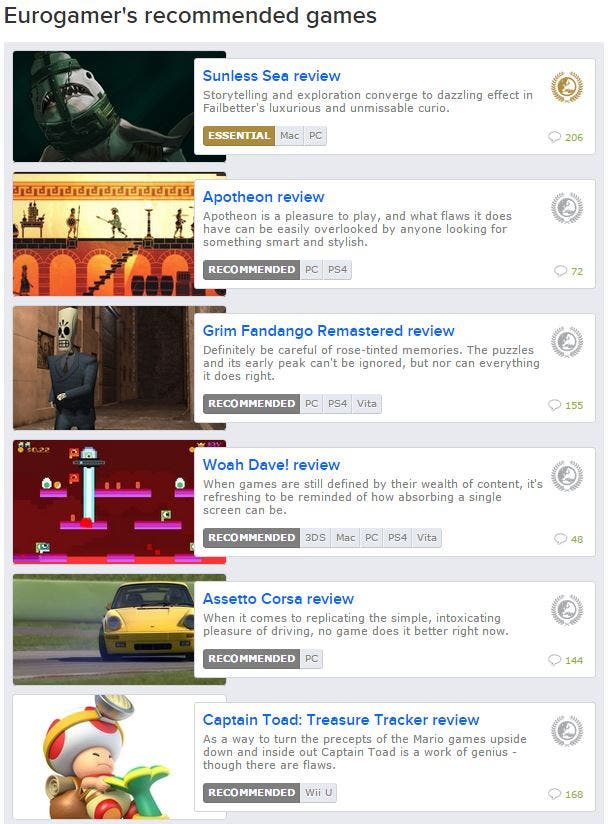Eurogamer has dropped review scores
New policy also puts matching the user experience first.
Starting today with our review of The Legend of Zelda: Majora's Mask 3D, Eurogamer is making the biggest change we've ever made to the way we review games. From now on, we will no longer be scoring games out of ten.
In place of scores, we'll have one-line summaries for every review, and a new recommendation system whereby some, but not all games will be considered Recommended, Essential or Avoid. As a result of these changes, we will no longer be listed on the review-aggregation site Metacritic.
We are also changing (or firming up) other areas of our reviews policy, with the intention of ensuring that we always review the same experience that you get when you buy a game. This means that we will only review from final retail versions and online games will be reviewed after they've launched.
So, why are we doing this? How does it work? What does it mean? Read on to find out. (There'll be an opportunity to ask me more about this change in a live question and answer session here on Eurogamer later today.)
Games are changing - so reviews should too
Since Eurogamer launched 15 years ago, the way video games are made and distributed has changed almost beyond recognition. In the last few years in particular, the rise of digital distribution and the assumption that most consoles and all computers are connected to the internet has resulted in much more fluid game development. Some games evolve right up to the moment of their commercial release, with a day one update. Some games are released commercially long before they are finished, via 'early access' versions. Some games never stop evolving.
The vast increase in popularity of online gaming has also changed our expectations, changed the designs of many types of game, introduced new technical challenges and increased the interaction between games and their audiences. You can argue that games with strong social multiplayer elements don't meaningfully exist - and can't be properly tested or understood - until they're being played by a fully-sized audience.
All of this has made the job of reviewing games much more unpredictable and complex. It has led to wildly varying review circumstances which challenge our ability to apply best practice. It has introduced new subtleties and variables to game performance and design which we need to assess.
At Eurogamer, we relish challenges like this, and we've worked hard to stay ahead of the situation. But we have recently felt that our review policy and format was making staying consistent and providing you with useful context harder than it should be. We needed to fix that.
We reached these conclusions and made a decision to drop scores and update our policy late last year. (It's interesting to note that our peers at the now sadly defunct US site Joystiq arrived at a very similar decision at around the same time, and for very similar reasons.)
Review scores don't work any more
This hasn't been the first time we've discussed dropping review scores. In the past, the case we've made for it internally has always been that a number is a very reductive way to represent a nuanced, subjective opinion, and that the arguments started by scores aren't productive. The counter-argument was simple but powerful: as an at-a-glance guide to what we think, scores were very useful to readers.
We no longer think that's true. In the present environment, scores are struggling to encompass the issues that are most important to you. How should we score an excellent game with severe networking issues? A flawlessly polished game with a hackneyed design? A brilliantly tuned multiplayer experience with dreadful storytelling? If you expect the score to encompass every aspect of a game, the task becomes an exercise in futility. Add an inflated understanding of the scoring scale in many quarters - whereby 7/10 and even sometimes 8/10 are construed as disappointing scores - and you have a recipe for mixed messages.
Scores are failing us, they're failing you, and perhaps most importantly, they are failing to fairly represent the games themselves.
Our new recommendation system
The first and most important component of our new system is a punchy summary that will appear at the top of every review (so you don't have to scroll all the way down and back up again any more). This will give you the headline: a strong indication of how we feel about a game and what is most noteworthy about it. It will be short, about the length of a tweet - but when it comes to getting our message across, 140 characters is still a big advance on one number.
Beyond this, we still wanted a way to highlight the games that we feel most strongly about. So, some - but once again, not all - games will be flagged as Recommended, Essential or Avoid.

- Recommended games are just that. They're the games we really want to bring to your attention, maybe even give you a friendly shove towards. They're the games that we find most interesting, most exciting, most fun. Broadly, they're games that would have been scored at the high end of the old scale - but we're going to use Recommended in a different, more flexible way. For example, a flawed game that we love for its originality and creativity might be Recommended, while a technically accomplished but derivative game might not be.

- Essential games are the best of the best. They're games that thrill us to the core, that get to the heart of what video gaming can and should be. We only expect to see a handful of Essential games every year.

- Avoid rests at the opposite end of the spectrum. Again, we expect to use this pretty rarely. It's not so much for games that aren't to our taste as games that have serious flaws in design, technology or concept - flaws that make them impossible to recommend spending hard-earned money or precious time on. It's for games that are broken or just straight-up terrible.
- So what about games that carry no recommendation? This will cover a pretty broad spectrum of quality, but typically they'll be games with some qualities to recommend them but about which we have important reservations. This is where you'd find, for example, a sports game that provides no meaningful advance on last year's model, or an indie game with beautiful artwork but irritating design, or a well-made action-adventure with a dull storyline and samey gameplay. In these cases, the summary line should let you know whether you're interested to read more.
We've recommended some games already

To give you an idea of how the system works, and to populate the site with useful lists of recommended games, we've gone over every review as far back as 1st January 2014 and flagged our favourite games as Recommended and Essential. (Their scores still stand, and we were guided by the original review in our choices.)
In addition, we've gone back a bit further on PlayStation 4, Xbox One and Wii U to cover all reviews since the launches of these machines, including ports of even earlier releases such as Spelunky. That makes for pretty definitive lists of recommended games for the current three home consoles.
You can peruse these in our new Recommended Games index, where you can filter by platform, or for Essential games only. We think it's a pretty useful new feature for the site, and fun to browse.
What this means for Metacritic (and Google)
From now on, Eurogamer reviews will no longer be listed on Metacritic. We just don't think there's a fair way to interpret our new system in Metacritic's 100-point scale. We don't want to do it ourselves and we don't want Metacritic doing it for us. For many game creators, far too much is riding on a Metascore - good or bad - for us to allow it to be influenced by a rating that we don't think represents us fairly, or that we don't have full control over.
Over the years, we've come to believe that the influence of Metacritic on the games industry is not a healthy one (and we're not alone in this opinion in the industry, either). This is not the fault of Metacritic itself or the people who made it, who just set out to create a useful resource for readers. It's a problem caused by the over-importance attached to Metascores by certain sectors of the games business and audience - Metascores which are, let's remember, averages of dozens of numerical values, ascribed more or less arbitrarily, in different systems, by a wide range of reviewers expressing a wide range of opinions. The result has been conservatism in mainstream game design and a stifling of variety in critical voices. In short: it's meant less interesting and innovative games.
So we felt it was the right thing to do to stop feeding this system. It's not the reason we decided to drop scores, but it is an important benefit of the move.
When searching for reviews in Google, however, you will still see star ratings attached to Eurogamer reviews: five stars for Essential, four for Recommended, one for Avoid, three for everything else. Google is a very important source of traffic for us, and it's vital that our reviews are made easy to find by being as featured as prominently as possible. The star ratings help a great deal with this, and we feel that the scheme I've just described is a pretty close match for our system that won't misrepresent our reviews. That said, it's important they are not misinterpreted as us sneaking a numerical score out there by stealth. If you see three stars against our review on Google, that means the game belongs to a broad middle band of quality - not that it secretly got 6/10.
We will only review online games after launch...
Too often in the last few years, we've found that the game we review does not resemble the experience gamers have when it launches. (Perhaps you can guess which games I am talking about.) From now on, making every attempt to match your experience will be of paramount importance in all our reviewing.
It has been our policy for a while that we only review games that require an internet connection - games such as Destiny - after launch. We're now extending this policy to cover all predominantly online games. What we mean by that is games where we believe online play is of critical importance to the majority of players. (So, Call of Duty would qualify, but Assassin's Creed probably wouldn't.) We're doing this because we don't think it's possible to properly test networking technology or assess long-term multiplayer game design without a full player population.
...But we will give early impressions on day one or before
We understand your need to make informed buying decisions at launch, so when we delay the review of an online game, we will always seek to publish an early opinion on it. This article won't be called a review; it won't be comprehensive or represent our final word on the game. It will, however, offer you useful information and a robust opinion based on a solid amount of gameplay.
These articles will appear on the day of the game's launch - perhaps the day after if there is zero prior access - or on the review embargo set by the publisher, and they will be based on whatever access we've been able to obtain. The full review will then follow when we're ready - that will vary by game, but typically it will be after around a week's play. We've already tried this approach on games like Destiny, The Crew and Elite: Dangerous, and we think it works well. We also published early impressions of Evolve yesterday and will follow up with a full review early next week.
We will only review retail versions of games
Even single-player games are developed right up until the last moment these days, so it's still very important in these cases that we try to review the game as it will be when you buy it. For console games, this means that we will no longer review from pre-release "debug code", but only from a version that will play on a regular retail machine.
In practice, this rules out all publisher-hosted review events for Eurogamer reviews. (Our ethics policy previously allowed us to attend these if we paid our own travel and accommodation costs.) We may still attend these events or use debug code for the purposes of other coverage - to make videos or get hands-on impressions, for example - but it will never be the basis of our final review.
We will avoid updating reviews
Regularly updated reviews might seem like the answer to changing circumstances (and changing games), but we don't believe they're helpful to readers. So we will avoid updating our reviews unless there are extraordinary circumstances. We will always seek to publish the most authoritative review we can to begin with - delaying it if need be - and include reasonable assumptions about the future development of the game in our assessment. If a game changes radically enough over time, we're more likely to consider a full re-review than an update.

We hope you understand where we're coming from with these changes and can get behind them. At Eurogamer, we're passionate about reviews. We work hard on them and we're always thinking hard about how to make them better. As editor, they're very close to my heart - I was the site's reviews editor for years, and consider myself a critic first and foremost - so that's not going to change any time soon. We think the role video game reviews fulfil is changing, but if reviews change to reflect that, they won't lose any relevance or importance. Quite the opposite.
And for our long-term readers... from now on, you'll never be able to say that anything is better than Halo.

